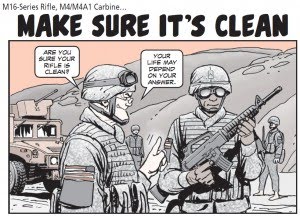For shooters who live in locations where it gets just too damn hot comes this excellent advice from Jim Shepherd, editor and publisher of The Shooting Wire.
With temperatures (and humidity) near triple-digits for the next few days, I’m thankful that the majority of the new gear doesn’t need to be taken to the range to be prepped. In the deep South, summertime is the equivalent of the dead of winter in other parts of the country. You can get outside, but not without paying quite a price.
It’s also a time when your firearms and other gear are highly susceptible to one of the most damaging of all threats – rust.
High humidities cause guns to attract condensation like a leaky double-paned window. Going from air conditioning to sweltering heat will fog more than your glasses. When cold firearms are quickly taken into heat and humidity, the oily residue from physical contact with metal parts shows up as what it really is- a powerful corrosive.
For that reason, I treat my firearms the same way I do my camera equipment. If I’m going outside with advance notice, I put my gear in the garage well in advance. When I leave, it’s far closer to ambient temperatures – and prevents condensation.
And before you accuse me of being reckless, there’s a safe in the garage for that transitioning. Being cautious about your gear doesn’t mean you have an excuse to be reckless. If you own a gun – rusty or not – you’re still responsible for keeping it under control at all times. For me, that means on my side or locked in the safe during the day. At night, well, where my gun is is none of your business.
Anyway…If I find myself going out unexpectedly, I’ve been known to put my spare magazines inside a sandwich bag until they’ve had the opportunity to warm up. It’s not such a problem if you carry a polymer sidearm, but you might want to think a little about your favorite 1911 if you run in and out of air conditioning. Keep it well lubricated – inside and out – to protect it from the elements- and contact with your skin.
You don’t have to live in Alabama like Jim to get near triple digit summer days – or high humidity.

